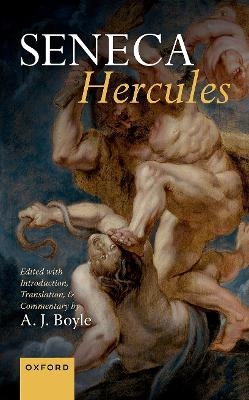
Seneca Hercules
Oxford University Press (Verlag)
978-0-19-885694-8 (ISBN)
Hercules is a tragedy of great theatrical, poetic, and cultural value. Written probably at the intersection of the principates of Claudius and Nero, it addresses central issues of early imperial Rome, even as it speaks profoundly to our times. Among its concerns are violence and madness; imperatives of family and self; Rome, identity and place; the nature of virtue; the longing for immortality; the theatre of rage; and the empire of death. The play is dramatically innovative, spectacular, and arresting: from its fiery, monumental god-prologue (the only one in Senecan tragedy), through meditative soliloquies, impassioned speeches, trenchant dialogue, a failed wooing scene with an impressive after-life in Tudor drama, a stunning entrance for Hercules and his captured hellhound, Theseus' ecphrastic narrative of the hero's infernal 'labour', to a familicidal madness scene and an emotionally turbulent, non-violent finale, in which the instinct for self-punitive suicide is thwarted by the claims of kinship and the acceptance of intolerable suffering. The whole is bound together by some of Seneca's most affective choral lyrics, as intellectually engaging as they are emotionally potent.
Hercules is A. J. Boyle's sixth, full-scale edition for OUP of a play by or attributed to Seneca. It offers a comprehensive introduction, newly edited Latin text, English verse translation designed for both performance and academic study, and a detailed exegetic, analytic, and interpretative commentary. The aim has been to elucidate the text dramatically as well as philologically, and to locate the play firmly in its contemporary historical and theatrical context and the ensuing literary and dramatic tradition. As such, its substantial influence on European drama from the sixteenth to the twenty-first centuries is given emphasis throughout; this and the accessibility of the commentary to Latinless readers make the edition particularly useful to scholars and students not only of classics, but also of comparative literature and drama, and to anyone interested in the cultural dynamics of literary reception and the interplay between theatre and history.
A. J. Boyle was born in 1942 in Warrington, England, and was educated at St. Benedict's Primary School Warrington, St. Francis Xavier's College Liverpool, Manchester University, and Downing College Cambridge. After a brief spell as a Bye-Fellow of Downing College, he took up a faculty position at Monash University in Melbourne Australia, where he taught for twenty years. He became Professor of Classics at the University of Southern California in Los Angeles at the beginning of 1989 and remains so today. In Australia he co-founded the international literary journal Ramus, which he still edits in its 51st year.
Preface
Introduction
I: Seneca and Rome
II: Roman Theatre
III: The Declamatory Style
IV: Seneca's Theatre of Violence
V: Seneca and Suicide
VI: The Myth before Seneca
VII: The Play
VIII: Reception of Seneca's Hercules
IX: Metre
X: The Translation
TEXT AND TRANSLATION
Selective Critical Apparatus
Differences from the 1986 Oxford Classical Text
COMMENTARY
Select Bibliography
Indexes
I: Latin Words
II: Passages from Other Plays of the Senecan Tragic Corpus
III: General Index
| Erscheinungsdatum | 10.07.2023 |
|---|---|
| Übersetzer | A. J. Boyle |
| Verlagsort | Oxford |
| Sprache | englisch |
| Maße | 147 x 223 mm |
| Gewicht | 986 g |
| Themenwelt | Literatur ► Klassiker / Moderne Klassiker |
| Literatur ► Lyrik / Dramatik ► Dramatik / Theater | |
| Geschichte ► Allgemeine Geschichte ► Vor- und Frühgeschichte | |
| Geschichte ► Allgemeine Geschichte ► Altertum / Antike | |
| ISBN-10 | 0-19-885694-6 / 0198856946 |
| ISBN-13 | 978-0-19-885694-8 / 9780198856948 |
| Zustand | Neuware |
| Informationen gemäß Produktsicherheitsverordnung (GPSR) | |
| Haben Sie eine Frage zum Produkt? |
aus dem Bereich


